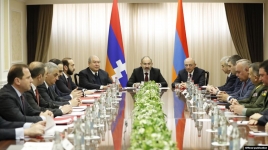Armenian, Karabakh Leaders Meet In Yerevan
Monday, December 23, 2019
Prime Minister Nikol Pashinian spoke of “modest” results achieved in Armenian-Azerbaijani peace talks this year as he chaired a meeting of Armenia’s and Nagorno-Karabakh’s leaders and top security officials in Yerevan on Monday.
In what was their second joint session in 2019, the Armenian and Karabakh national security councils discussed the Karabakh peace process, military issues and a presidential election that will be held in the Armenian-populated territory next spring.
Pashinian’s office released the opening statements made at the meeting by the prime minister and Presidents Armen Sarkissian of Armenia and Bako Sahakian of Karabakh. But it reported no other details of the discussion.
“Armenia will continue to act as a guarantor of Artsakh’s comprehensive security,” Pashinian declared before commenting on the conflicting parties’ failure to reach a breakthrough in their talks mediated by the United States, Russia and France.
While noting a noticeable decrease in ceasefire violations in the conflict zone since 2018, he said the peace process has produced “modest” results so far and blamed Azerbaijan for that. He again complained that Azerbaijani President Ilham Aliyev has not reciprocated his repeated statements to the effect that a peaceful settlement must be acceptable to the peoples of Armenia, Karabakh and Azerbaijan.
More importantly, Pashinian accused Baku of misinterpreting a framework peace accord drafted by the U.S., Russian and French co-chairs of the OSCE Minsk Group and known as the Madrid Principles. He singled out its provisions relating to Karabakh’s future status.
“The Minsk Group co-chairs’ interpretation of this matter is substantially different from Azerbaijan’s, which is certainly cause for optimism about the proposed negotiating base,” he said.
In a joint statement issued in March, the co-chairs said “any fair and lasting settlement” must involve “return of the territories surrounding Nagorno-Karabakh to Azerbaijani control; an interim status for Nagorno-Karabakh providing guarantees for security and self-governance; a corridor linking Armenia to Nagorno-Karabakh; future determination of the final legal status of Nagorno-Karabakh through a legally binding expression of will.”
The latter provision presumably involves a referendum in which Karabakh’s predominantly Armenian population would be able to determine the territory’s internationally recognized status.
In a “memorandum” circulated ahead of the recent meeting of the Armenian and Azerbaijani foreign ministers, the Azerbaijani mission to the OSCE said that Karabakh residents can only be granted “the status of self-rule … within Azerbaijan.”
Foreign Minister Zohrab Mnatsakanian denounced this “maximalist” stance after the December 4 meeting with his Azerbaijani counterpart Elmar Mammadyarov. Mnatsakanian insisted on Karabakh’s right to “maintain and determine a status outside the jurisdiction, sovereignty or territorial integrity of Azerbaijan.”
Pashinian said in this regard that Baku will only prolong the status quo if it seeks to “make the realization of the principle of people’s self-determination non-use of force relative.” He also warned against attempts to end the conflict by force, saying that that they would have “disastrous consequences for Azerbaijan in the first instance.”
For his part, Sahakian referred to Armenia and Karabakh as “two inseparable parts of one homeland.”
“I want to once again emphasize that for us there can be no return to the past in terms of both the status and borders,” said the Karabakh leader, who will not be seeking another term in office in the election due in March or April.
https://www.azatutyun.am/a/30340481.html





